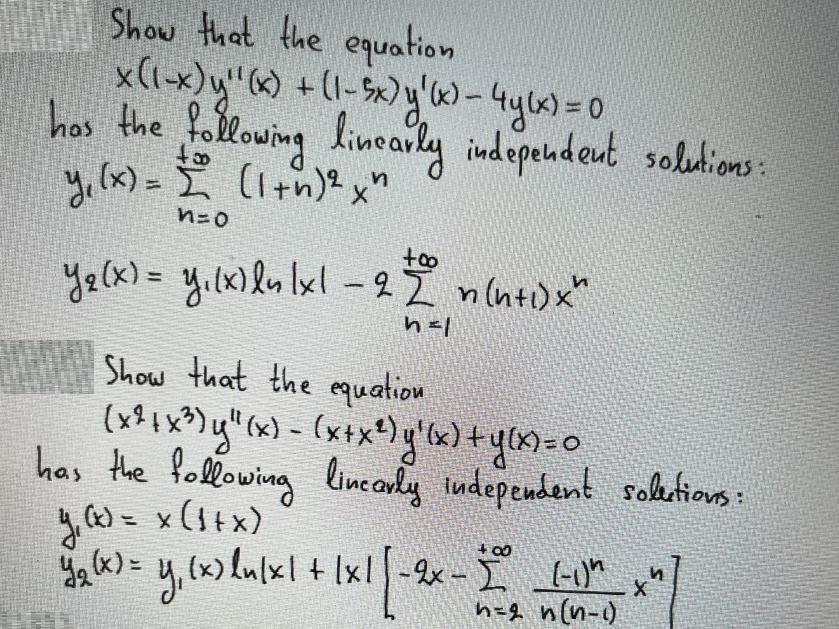Question
Show that the equation x (1-x) y (x) + (1 - 5x) y (x) - 4y(x) = 0 has the following linearly independent solutions:

Show that the equation x (1-x) y (x) + (1 - 5x) y (x) - 4y(x) = 0 has the following linearly independent solutions: y (x) = [ (1+n) x n n=0 too Y(x) = y(x)lu (x1 - 2 n(n+1)x" n=1 Show that the equation (x + x) y " (x) - (x+x) y'(x) + y(x) = 0 has the following lincarly independent solections: y (x) = x (1+x) , 1 Y(x) = y (x) lu|x1 + 1x1 | -2x - 2 --jh y, n=2 n(n-1) X
Step by Step Solution
3.37 Rating (147 Votes )
There are 3 Steps involved in it
Step: 1
To show that the differential equation x1xyx 15xyx 4yx 0 has the solutions yx 1nxn and yx yxlnx12nn1 ...
Get Instant Access to Expert-Tailored Solutions
See step-by-step solutions with expert insights and AI powered tools for academic success
Step: 2

Step: 3

Ace Your Homework with AI
Get the answers you need in no time with our AI-driven, step-by-step assistance
Get StartedRecommended Textbook for
College Physics
Authors: Jerry D. Wilson, Anthony J. Buffa, Bo Lou
7th edition
9780321571113, 321601831, 978-0321601834
Students also viewed these Mathematics questions
Question
Answered: 1 week ago
Question
Answered: 1 week ago
Question
Answered: 1 week ago
Question
Answered: 1 week ago
Question
Answered: 1 week ago
Question
Answered: 1 week ago
Question
Answered: 1 week ago
Question
Answered: 1 week ago
Question
Answered: 1 week ago
Question
Answered: 1 week ago
Question
Answered: 1 week ago
Question
Answered: 1 week ago
Question
Answered: 1 week ago
Question
Answered: 1 week ago
Question
Answered: 1 week ago
Question
Answered: 1 week ago
Question
Answered: 1 week ago
Question
Answered: 1 week ago
Question
Answered: 1 week ago
Question
Answered: 1 week ago
Question
Answered: 1 week ago
Question
Answered: 1 week ago
View Answer in SolutionInn App



